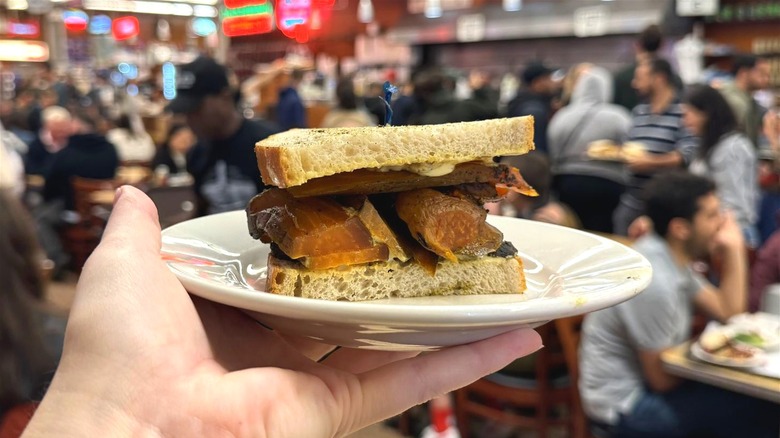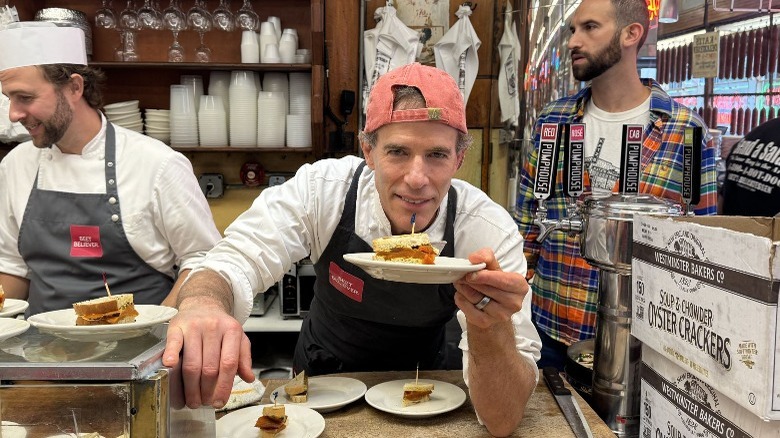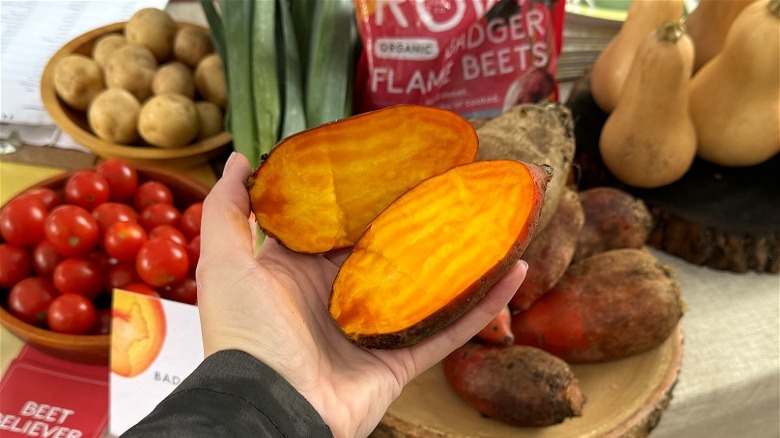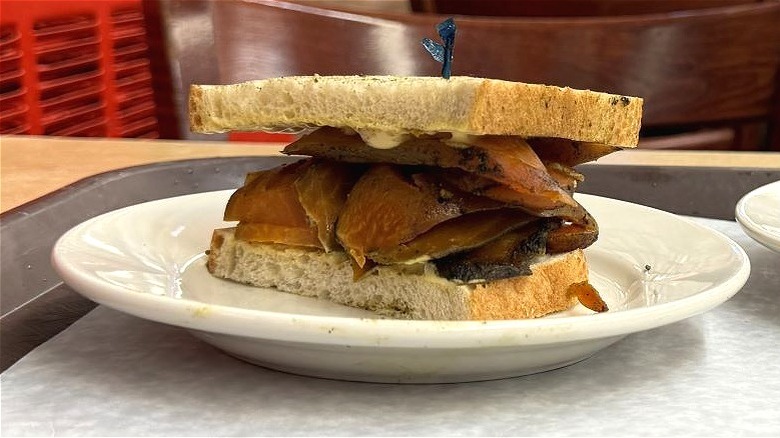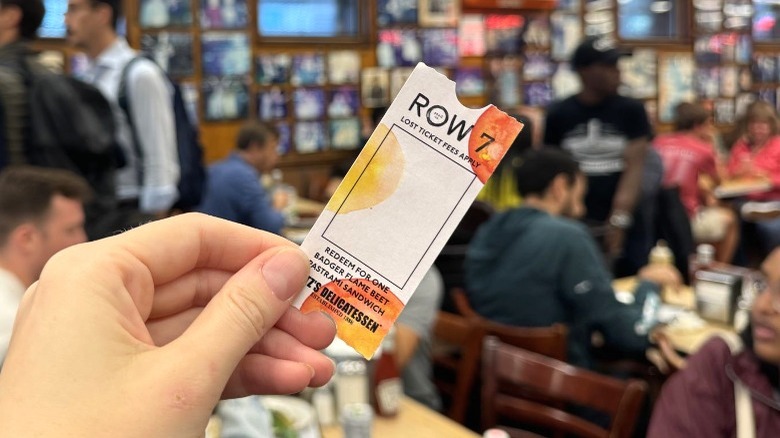We Tried The Katz's Deli X Row 7 One-Day-Only Vegetarian 'Pastrami' Sandwich
An institution on New York City's Lower East Side, Katz's Delicatessen has been serving up Jewish (but not kosher) classics since the late 1800s. The shop is best known for two things: the iconic "I'll have what she's having" scene from "When Harry Met Sally" and towering, $20+ pastrami sandwiches.
As a longtime East Village resident and former LES history museum worker, I know Katz's. I've given directions to it more times than I can count and even visited on a handful of occasions when friends and relatives wanted to see what all the hubbub was about. However, as an even longer-time vegetarian, what I haven't done is eaten there — that is, until last weekend.
In a collaboration that almost seems like it was created for me, bougie seed-turned-produce company Row 7 (helmed by chef Dan Barber of Blue Hill fame) and Katz's teamed up to create a vegetarian take on the deli's famous meaty behemoth, served at the delicatessen for one day only. This was my chance to finally sink my teeth into a piece of neighborhood history.
How did the Katz's Deli x Row 7 collaboration happen?
Row 7 approached Katz's with the idea of teaming up to create a meat-free take on the pastrami sandwich. "The Katz's collaboration has been many years in the making," Row 7 president Charlotte Douglas shared. "We were thinking about how you introduce people to the idea of vegetables at the center of the plate, thinking about iconic New York dishes, and Katz's was at the top of that list." Luckily, the Katz's team was all in.
"Jake [Dell] felt his grandfather [Martin Dell] would have loved it," chef Dan Barber explained. And he knew from the start that the Row 7 beet would be the perfect veggie to take on the challenge. "Every time we roasted the beets, it was like the most umami, meaty, rich vegetable. You can treat it like meat," the Blue Hill chef shared, "and then we started curing it like pastrami and ... I got Katz's actual spice mix." Barber and Dell worked together on the beet preparation, "refining something that would appropriately honor the pastrami," as Douglas put it. Barber also credits the beet — and its breeder, Irwin Goldman — for making their job significantly easier: "Honestly, the recipe was written by [Goldman]; we're just accentuating it a bit. If the genetics weren't there, it would just be a beet."
A beet like no other
Katz's vegetarian pastrami sandwich was made with a very special beet. Adorably named the "Badger Flame Beet," Row 7 vegetable breeder Irwin Goldman told me the root veg has been in the works for over 15 years.
Originally attempting to create a beet with yellow and red concentric circles (similar to a candy-stripped beet), Row 7 began breeding out the "beety" qualities many people dislike, attempting to create something more widely approachable — a "gateway beet," as Irwin calls it. To achieve this, the team turned to a gene bank to find the perfect specimen. They bred this rare red beet with a more standard yellow beet and slowly but surely achieved their goal. (Though, sadly, they never achieved the circles.) The Badger Flame beet has vibrant orange-red skin and mostly yellow flesh, with an almost watercolor-like quality being the only hint at its superficial past.
The end result is less earthy and astringent than your standard beet and can be eaten raw. Research farm employee Bill Reilly explained to me that one of the things bred out was the high level of oxalic acid. (If you've ever felt some itchiness or scratchiness at the back of your throat when eating the root veg, you now know what to curse.) Dressed simply with some white vinegar and salt, the raw beet is very refreshing. You can still taste that it is a beet, but the flavor is brighter and much less "dirt"-forward than your standard supermarket option.
Did Katz's vegetarian pastrami sandwich taste like the real deal?
Katz's vegetarian "pastrami" sandwich was almost identical to its iconic meat offering, served on rye bread with a smear of mustard and mayo, plus a side of pickles (one new, the other full sour). Really, the only difference between the two was the lack of meat, which would be quite impossible to miss. At first, I was slightly disappointed that this was more of a pastrami-inspired sandwich than one replicating the taste and texture of the meat, but I quickly got over my assumptions and expectations.
The flavor of the "beet meat" varied slightly from bite to bite. The slices were quite thick, and pieces that were closer to the outside naturally took on more of the pastrami spice blend flavor than pieces taken from the center of the veg. This was especially noticeable with slices from larger beets.
The beets in general were good, with a decent spice to them, and they added some sweetness that nicely contrasted the sharp mustard. As is the case with all Katz's sandwiches, the veggie version was incredibly messy to eat.
Katz's veggie pastrami sandwich gives me hope for the future of farming
Do I feel like I got my taste of New York history by eating Katz's and Row 7's vegetarian "pastrami" sandwich? Not really. While the sandwich itself was tasty and I'm very glad I was able to try this super-limited lunch, it didn't resemble its meaty inspiration all that closely. With that said, it was still a good sandwich and a nice way to spend a rainy Saturday afternoon.
What I am more excited about (and felt more energized by) is the future of Row 7. When the company first came across my radar, it felt totally inaccessible — the price too high, the availability too limited. As the years have progressed, the company has been able to expand its reach without increasing prices or compromising on quality and its values.
When speaking to Charlotte Douglas, we discussed the inherent flaws in the current agricultural model and the commodities market. When food is pushed toward uniformity, year-round availability, and unsustainably low prices, someone, somewhere, pays. Currently, the people paying are consumers (in the form of flavorless vegetables harvested before they're ready) and producers (who are often underpaid and work long hours in brutal, sometimes unsafe conditions). But if Row 7 has its way, everyone will be given the opportunity to consume higher-quality produce, grown and harvested by people treated with respect and dignity. And I'll take that brighter future over a faux meat sandwich any day.
